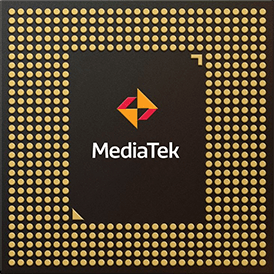
MediaTek Dimensity 1200 Benchmark, Test and specs
Last updated:
The MediaTek Dimensity 1200 has 8 CPU cores and can process 8 threads at the same time. The processor was presented in Q1/2021 and is based on the 2. Generation of the Mediatek Dimensity series. In the Geekbench 5 benchmark, the MediaTek Dimensity 1200 achieved a result of 868 points (single-core) or 3,075 points (multi-core).

| Name: | MediaTek Dimensity 1200 |
|---|---|
| Family: | Mediatek Dimensity (36) |
| CPU group: | MediaTek Dimensity 1100/1200/1300 (3) |
| Architecture: | Cortex-A78 / Cortex-A55 |
| Segment: | Mobile |
| Generation: | 2 |
| Predecessor: | -- |
| Successor: | -- |
CPU Cores and Base Frequency
The MediaTek Dimensity 1200 has 8 cores. The clock frequency of the MediaTek Dimensity 1200 is 3.00 GHz. An initial performance assessment can be made using the number of CPU cores.
| CPU Cores / Threads: | 8 / 8 |
|---|---|
| Core architecture: | hybrid (Prime / big.LITTLE) |
| A-Core: | 1x Cortex-A78 |
| B-Core: | 3x Cortex-A78 |
| C-Core: | 4x Cortex-A55 |
| Hyperthreading / SMT: | No |
|---|---|
| Overclocking: | No |
| A-Core Frequency: | 3.00 GHz |
| B-Core Frequency: | 2.60 GHz |
| C-Core Frequency: | 2.00 GHz |
Internal Graphics
The MediaTek Dimensity 1200 has an integrated graphics that the system can use to efficiently play back videos. The MediaTek Dimensity 1200 has the ARM Mali-G77 MP9 installed, which has 9 streaming multiprocessors (144 shaders).
| GPU name: | ARM Mali-G77 MP9 |
|---|---|
| GPU frequency: | 0.85 GHz |
| GPU (Turbo): | No turbo |
| Compute units: | 9 |
| Shader: | 144 |
| Hardware Raytracing: | No |
| Release date: | Q2/2019 |
| Max. displays: | 1 |
|---|---|
| Generation: | Vallhall 1 |
| Direct X: | 12 |
| Technology: | 7 nm |
| Max. GPU Memory: | 4 GB |
| Frame Generation: | No |
Hardware codec support
Processors with integrated graphics can process video codecs faster. Support for modern codecs can significantly increase system efficiency during video playback.
| h265 / HEVC (8 bit): | Decode / Encode |
|---|---|
| h265 / HEVC (10 bit): | Decode / Encode |
| h264: | Decode / Encode |
| VP8: | Decode / Encode |
| VP9: | Decode / Encode |
| AV1: | Decode |
|---|---|
| AVC: | Decode / Encode |
| VC-1: | Decode / Encode |
| JPEG: | Decode / Encode |
Memory & PCIeThe MediaTek Dimensity 1200 supports a maximum of 16 GB memory. Depending on the mainboard, the processor can use a maximum of 4 (Quad Channel) memory channels. This results in a maximum bandwidth of the main memory of 34.1 GB/s. |
|
| Memory type: | Memory bandwidth: |
|---|---|
| LPDDR4X-4266 | 34.1 GB/s |
| Max. Memory: | 16 GB |
| Memory channels: | 4 (Quad Channel) |
| ECC: | No |
| PCIe: | |
| PCIe Bandwidth: | -- |
Thermal ManagementThe MediaTek Dimensity 1200 has a TDP of . Based on the TDP, the system manufacturer can and must adapt the cooling solution to the processor. |
|
|---|---|
| TDP (PL1 / PBP): | |
| TDP (PL2): | -- |
| TDP up: | -- |
| TDP down: | -- |
| Tjunction max.: | -- |
Technical details
Modern production reduces the waste heat of a processor and increases its efficiency. The MediaTek Dimensity 1200 is made in 6 nm and has 0.00 MB cache.
| Technology: | 6 nm |
|---|---|
| Chip design: | Chiplet |
| Socket: | -- |
| L2-Cache: | -- |
| L3-Cache: | -- |
| AES-NI: | No |
| Operating systems: | Android |
| Virtualization: | None |
|---|---|
| Instruction set (ISA): | Armv8-A (64 bit) |
| ISA extensions: | -- |
| Release date: | Q1/2021 |
| Release price: | -- |
| Part Number: | MT6893 |
| Documents: | Technical data sheet |
Rate this processor
Benchmark results

The benchmark results for the MediaTek Dimensity 1200 have been carefully checked by us. We only publish benchmark results that have been created by us or that have been submitted by a visitor and then checked by a team member. All results are based on and fullfill our benchmark guidelines.
Geekbench 5, 64bit (Single-Core)
Geekbench 5 is a cross plattform benchmark that heavily uses the systems memory. A fast memory will push the result a lot. The single-core test only uses one CPU core, the amount of cores or hyperthreading ability doesn't count.

|
Intel Core i5-4590S
4C 4T @ 3.70 GHz |
||

|
Intel Xeon E5-2687W v2
8C 16T @ 4.00 GHz |
||

|
Qualcomm QCM6490
8C 8T @ 2.71 GHz |
||
|
|
MediaTek Dimensity 1200
8C 8T @ 3.00 GHz |
||

|
Intel Core i3-4360
2C 4T @ 3.70 GHz |
||

|
AMD Athlon PRO 300U
2C 4T @ 3.30 GHz |
||

|
Intel Core i3-8300T
4C 4T @ 3.20 GHz |
||
Geekbench 5, 64bit (Multi-Core)
Geekbench 5 is a cross plattform benchmark that heavily uses the systems memory. A fast memory will push the result a lot. The multi-core test involves all CPU cores and taks a big advantage of hyperthreading.

|
Intel Core i7-6700HQ
4C 8T @ 3.20 GHz |
||

|
Intel Core i7-8650U
4C 8T @ 2.60 GHz |
||

|
Intel Core i7-4770T
4C 8T @ 3.20 GHz |
||
|
|
MediaTek Dimensity 1200
8C 8T @ 3.00 GHz |
||

|
Intel Core i5-5575R
4C 4T @ 3.10 GHz |
||

|
AMD Ryzen 5 1400
4C 8T @ 3.40 GHz |
||

|
Intel Atom C3808
12C 12T @ 2.00 GHz |
||
Geekbench 6 (Single-Core)
Geekbench 6 is a benchmark for modern computers, notebooks and smartphones. What is new is an optimized utilization of newer CPU architectures, e.g. based on the big.LITTLE concept and combining CPU cores of different sizes. The single-core benchmark only evaluates the performance of the fastest CPU core, the number of CPU cores in a processor is irrelevant here.

|
AMD Ryzen 7 1700
8C 16T @ 3.70 GHz |
||

|
Intel Core i5-4590S
4C 4T @ 3.70 GHz |
||

|
AMD Ryzen 7 PRO 1700X
8C 16T @ 3.70 GHz |
||
|
|
MediaTek Dimensity 1200
8C 8T @ 3.00 GHz |
||

|
Intel Core i3-8121U
2C 4T @ 3.20 GHz |
||

|
Intel Core i5-4570
4C 4T @ 3.60 GHz |
||

|
Intel Core i5-7360U
2C 4T @ 3.60 GHz |
||
Geekbench 6 (Multi-Core)
Geekbench 6 is a benchmark for modern computers, notebooks and smartphones. What is new is an optimized utilization of newer CPU architectures, e.g. based on the big.LITTLE concept and combining CPU cores of different sizes. The multi-core benchmark evaluates the performance of all of the processor's CPU cores. Virtual thread improvements such as AMD SMT or Intel's Hyper-Threading have a positive impact on the benchmark result.

|
Intel Celeron G6900
2C 2T @ 3.40 GHz |
||

|
Intel Core i5-4590S
4C 4T @ 3.30 GHz |
||
![AMD Ryzen 3 1200 [12nm] AMD Ryzen 3 1200 [12nm]](/images/cpu/amd_ryzen_3_1.jpg)
|
AMD Ryzen 3 1200 [12nm]
4C 4T @ 3.10 GHz |
||
|
|
MediaTek Dimensity 1200
8C 8T @ 3.00 GHz |
||

|
AMD Ryzen 3 PRO 1300
4C 4T @ 3.60 GHz |
||

|
Intel Core i5-4460
4C 4T @ 3.30 GHz |
||

|
Qualcomm Snapdragon 888
8C 8T @ 2.84 GHz |
||
iGPU - FP32 Performance (Single-precision GFLOPS)
The theoretical computing performance of the internal graphics unit of the processor with simple accuracy (32 bit) in GFLOPS. GFLOPS indicates how many billion floating point operations the iGPU can perform per second.

|
Apple A12X Bionic
Apple A12X @ 1.13 GHz |
||

|
Intel Core i3-13300HE
Intel UHD Graphics 13th Gen (48 EU) @ 1.30 GHz |
||

|
Intel Core i3-13300HRE
Intel UHD Graphics 13th Gen (48 EU) @ 1.30 GHz |
||
|
|
MediaTek Dimensity 1200
ARM Mali-G77 MP9 @ 0.85 GHz |
||

|
MediaTek Dimensity 8050
ARM Mali-G77 MP9 @ 0.85 GHz |
||

|
MediaTek Dimensity 8020
ARM Mali-G77 MP9 @ 0.85 GHz |
||

|
MediaTek Dimensity 1300
ARM Mali-G77 MP9 @ 0.85 GHz |
||
AnTuTu 9 Benchmark
The AnTuTu 9 benchmark is very well suited to measuring the performance of a smartphone. AnTuTu 9 is quite heavy on 3D graphics and can now also use the "Metal" graphics interface. In AnTuTu, memory and UX (user experience) are also tested by simulating browser and app usage. AnTuTu version 9 can compare any ARM CPU running on Android or iOS. Devices may not be directly comparable when benchmarked on different operating systems.
In the AnTuTu 9 benchmark, the single-core performance of a processor is only slightly weighted. The rating is made up of the multi-core performance of the processor, the speed of the working memory, and the performance of the internal graphics.
In the AnTuTu 9 benchmark, the single-core performance of a processor is only slightly weighted. The rating is made up of the multi-core performance of the processor, the speed of the working memory, and the performance of the internal graphics.

|
Qualcomm Snapdragon 865+
8C 8T @ 3.10 GHz |
||

|
Google Tensor
8C 8T @ 2.80 GHz |
||

|
MediaTek Dimensity 1300
8C 8T @ 3.00 GHz |
||
|
|
MediaTek Dimensity 1200
8C 8T @ 3.00 GHz |
||

|
Qualcomm Snapdragon 865
8C 8T @ 2.84 GHz |
||

|
Apple A13 Bionic
6C 6T @ 2.65 GHz |
||

|
MediaTek Dimensity 1100
8C 8T @ 2.60 GHz |
||
AnTuTu 8 Benchmark
The AnTuTu 8 Benchmark measures the performance of a SoC. AnTuTu benchmarks the CPU, GPU, Memory as well as the UX (User Experience) by simulating browser and app usage. AnTuTu can benchmark any ARM CPU that runs under Android or iOS. Devices may not be directly compareable if the benchmark has been performed under different operating systems.
In the AnTuTu 8 benchmark, the single-core performance of a processor is only slightly weighted. The evaluation consists of the multi-core performance of the processor, the speed of the RAM and the performance of the internal graphics.
In the AnTuTu 8 benchmark, the single-core performance of a processor is only slightly weighted. The evaluation consists of the multi-core performance of the processor, the speed of the RAM and the performance of the internal graphics.

|
MediaTek Dimensity 1100
8C 8T @ 2.60 GHz |
||
|
|
HiSilicon Kirin 9000E
8C 8T @ 3.13 GHz |
||

|
Apple A14 Bionic
6C 6T @ 3.00 GHz |
||
|
|
MediaTek Dimensity 1200
8C 8T @ 3.00 GHz |
||

|
Qualcomm Snapdragon 865+
8C 8T @ 3.10 GHz |
||

|
Google Tensor
8C 8T @ 2.80 GHz |
||

|
Samsung Exynos 2100
8C 8T @ 2.90 GHz |
||
Estimated results for PassMark CPU Mark
Some of the CPUs listed below have been benchmarked by CPU-monkey. However the majority of CPUs have not been tested and the results have been estimated by a CPU-monkey’s secret proprietary formula. As such they do not accurately reflect the actual Passmark CPU mark values and are not endorsed by PassMark Software Pty Ltd.

|
Intel Xeon E3-1220 v3
4C 4T @ 3.50 GHz |
||

|
Intel Core i5-6400
4C 4T @ 3.00 GHz |
||

|
Intel Core i7-3615QM
4C 8T @ 2.30 GHz |
||
|
|
MediaTek Dimensity 1200
8C 8T @ 3.00 GHz |
||

|
Intel Xeon W-2102
4C 4T @ 2.90 GHz |
||

|
Intel Core i7-4702MQ
4C 8T @ 2.90 GHz |
||

|
Intel Core i5-4590S
4C 4T @ 3.30 GHz |
||
Benchmarks

Geekbench 5 (SC)
2,488 entries
2,488 entries

Geekbench 5 (MC)
2,461 entries
2,461 entries

Geekbench 6 (SC)
1,755 entries
1,755 entries

Geekbench 6 (MC)
1,703 entries
1,703 entries

FP32 SP (iGPU)
2,042 entries
2,042 entries

AnTuTu 9 Benchmark
90 entries
90 entries

AnTuTu 8 Benchmark
118 entries
118 entries

PassMark CPU-Mark
2,392 entries
2,392 entries
Popular comparisons
back to index





